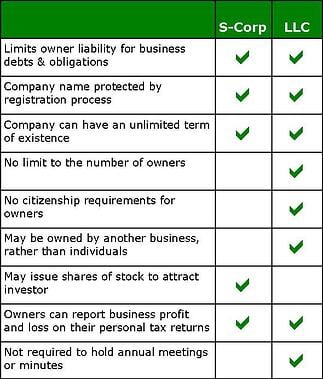Improper methods of fixed assets reporting can lead to losses
Spreadsheets weren't designed for the potentially complex job of tracking and managing fixed...
An LLC is a business structure similar to a sole-proprietorship or a general partnership. According to the IRS, "It is designed to provide the limited liability features of a corporate and the tax efficiencies and operational flexibility of a partnership." As a pass-through entity, all profits and losses pass through the business to the LLC owner (aka "member"). Similiar to partnerships, the member himself reports the profits/losses on their federal tax returns but not the LLC.
Operational Ease
One of the features that distinguishes the LLC from an S-Corp is its operational ease. There are far fewer forms required for registering and there are fewer start-up costs. Filing taxes is a once-a-year affair on April 15: a single-member LLC files a 1040 and Schedule C like a sole proprietor; Moreover, LLCs are not required to have formal meetings and keep minutes, although we do recommend doing this if possible in order to maintain accurate records for your organization.
As a seperate structure, S-Corps require scheduled director and shareholder meetings, minutes from those meetings, adoption and updates to by-laws, stock transfers and records maintenance. In addition to all of this paperwork are the tax forms required by the IRS.
Such forms include:
Taxes
The owner of an LLC is considered to be self-employed and must pay the 15.3% self-employment tax contributions towards Medicare and social security. As such, the entire net income of the LLCis subject to this tax. Conversely, only the wages of the S-Corp shareholder who is an employee are subject to employement tax. The remaining income is paid to the owner as a "distribution" which is taxed at a lower rate. The shareholder of an S-Corp must receive reasonable compensation which negates the concept of working independently whithout the employee relationship in any manner. And, if you try to cheat the system by paying yourself a lower salary and higher distrubutions you might get a tax advantage for the year, but the IRS takes notice of such red flags. If and when they reclassify your distributions as wages you'll be back to paying the higher employment tax and you will have the IRS's attention.

Chicago area ERP consultant with over 40 years of experience in Sage 300, Sage Pro, Quickbooks ERP and other systems
Spreadsheets weren't designed for the potentially complex job of tracking and managing fixed...
Rules of thumb for determining when it is time to upgrade your accounting software.